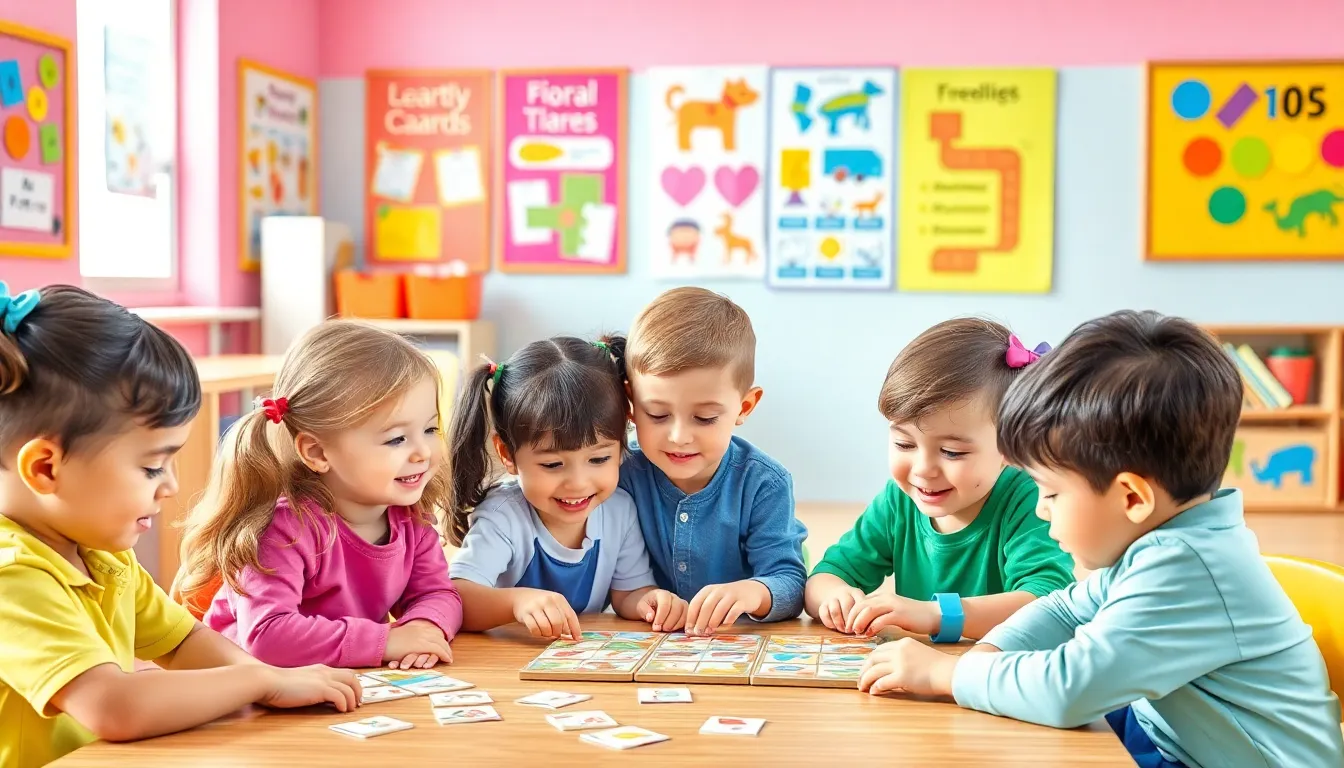When it comes to preschool games, the fun never stops, and the learning is sneaky! Picture this: a room full of giggles, tiny feet racing, and imaginations running wild. These games aren’t just about playtime; they’re the secret sauce for developing essential skills that’ll have little ones ready to conquer the world—or at least the playground.
Table of Contents
ToggleOverview of Preschool Games
Preschool games serve as an essential tool for child development. These activities foster creativity and critical thinking in a fun environment. Children engage in various games that promote cognitive growth and physical coordination.
When participating in group games, kids learn social skills, such as taking turns and sharing. Many games also encourage communication by prompting interactions among peers. Additionally, outdoor games enhance motor skills and allow children to explore their surroundings.
Examples of popular preschool games include “Simon Says,” which improves listening and following directions. “Duck, Duck, Goose” teaches children about rhythm and timing while promoting teamwork. Furthermore, arts and crafts games provide sensory experiences and encourage self-expression.
Variety is key when selecting preschool games. Incorporating educational elements, such as numbers or letters, strengthens foundational knowledge. Game rotation maintains interest and caters to different learning styles within a group setting.
Parents and educators can facilitate meaningful play by creating safe environments. Adult involvement often amplifies the learning experience, guiding children while allowing for independent exploration. Ultimately, preschool games combine enjoyment with skill development, laying the foundation for future educational success.
Benefits of Preschool Games

Preschool games offer substantial benefits that contribute to a child’s growth and development. Engaging in these activities fosters essential skills that support learning.
Cognitive Development
Cognitive development thrives through play-based activities. Games like puzzles, memory cards, and matching games stimulate problem-solving skills. Children develop critical thinking abilities while engaging in fun and interactive scenarios. Additionally, these games enhance memory retention and concentration, leading to improved academic performance later on. Research shows that children who participate in structured play develop language skills more quickly. Overall, preschool games lay a strong foundation for cognitive growth essential in future learning environments.
Social Skills Enhancement
Social skills develop significantly through group play. Children learn to communicate effectively while participating in games that require teamwork. Sharing toys and taking turns fosters cooperation and empathy among peers. In group settings, kids practice conflict resolution when disagreements arise, building essential negotiation skills. Furthermore, these interactions encourage kids to express emotions and understand others’ feelings, enhancing their emotional intelligence. Engage in various group games to nurture these social abilities while ensuring a fun, interactive experience for young learners.
Types of Preschool Games
Preschool games encompass various activities that enhance learning and development. Engaging young children in different types of games stimulates their growth and nurtures essential skills.
Indoor Games
Indoor games offer a perfect way to utilize limited spaces. Popular activities like “Simon Says” and “Musical Chairs” promote listening and following directions. Sensory bins filled with rice or beans encourage exploration and fine motor skills. Craft projects, such as collages, allow for creativity while honing hand-eye coordination. Role-playing games enhance social skills through imagination and cooperation. Ensuring a variety of games caters to different interests and learning styles keeps children engaged and eager to participate.
Outdoor Games
Outdoor games provide kids with opportunities for physical activity while exploring their surroundings. Classic games like “Duck, Duck, Goose” foster teamwork and movement. Playground activities, such as climbing and sliding, develop gross motor skills and coordination. Scavenger hunts encourage observation and critical thinking as children search for specific items. Coordinating group games like relay races builds cooperation and communication among peers. Fresh air and nature enhance the overall experience, promoting both physical and mental well-being.
Educational Games
Educational games blend fun with learning, making them effective tools for preschoolers. Matching games and puzzles boost cognitive skills, including memory retention and problem-solving. Storytime activities often integrate movement, helping children associate words with actions. Interactive board games that focus on numbers or letters enhance foundational mathematics and literacy skills. Digital educational games provide modern approaches to learning through engaging content, catering to children’s tech-savvy nature. Incorporating these games into daily routines enriches children’s educational experiences and fosters a lifelong love of learning.
Choosing the Right Preschool Games
Selecting appropriate preschool games plays a crucial role in maximizing engagement and learning. Numerous factors affect this selection process, including age appropriateness and safety considerations.
Age Appropriateness
Choosing games suitable for various age groups ensures children enjoy while learning. Games targeting specific age ranges often reflect developmental abilities. Younger children benefit from simple rules and vibrant visuals, fostering engagement and understanding. As children grow, they can handle more complex games that challenge their cognitive and social skills. For instance, cooperative games encourage teamwork and communication amongst older preschoolers. Observing children’s interests and abilities aids in selecting games that stimulate growth effectively.
Safety Considerations
Safety remains a top priority when selecting preschool games. Materials used in games must be non-toxic and age-appropriate, avoiding items with small parts that pose choking hazards. Additionally, ensuring a safe play environment minimizes accidents during active play. Age-related supervision is essential as well; adults should monitor activities to provide guidance and assistance as needed. Games requiring movement should promote safe space to prevent injury. Regularly inspecting toys and equipment guarantees they remain in good condition, further enhancing safety during play.
Preschool games are essential for fostering a child’s development in a fun and engaging way. They not only enhance cognitive and physical skills but also promote social interaction and emotional growth. By selecting age-appropriate and safe games, parents and educators can create enriching environments that encourage exploration and creativity. The right mix of indoor, outdoor, and educational activities keeps children engaged while laying a solid foundation for their future learning. Ultimately, incorporating these games into daily routines enriches children’s lives and nurtures a lifelong love for learning.



